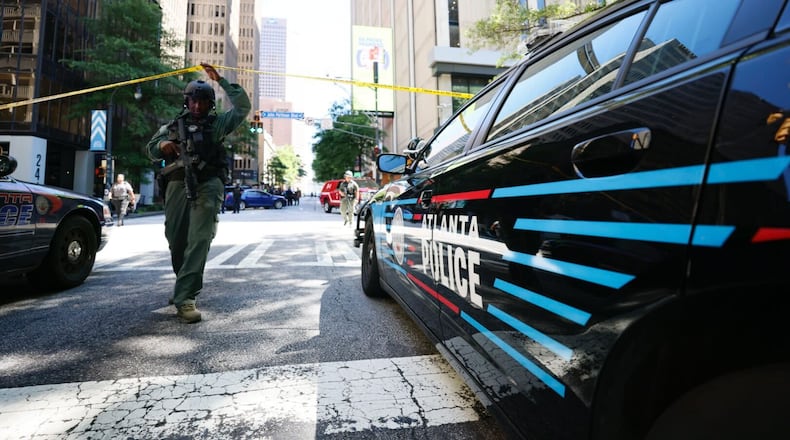This is a story I’ve written before, about a less-than-stellar visit to downtown.
But Atlanta, the self-proclaimed “World Class City” must hear this from time to time, especially as it tries to gussy up for the World Cup, coming in 2026.
Two weeks ago, the American Society for Microbiology held its annual conference here, drawing thousands of microbiologists and the millions of dollars that they spend. I spoke with two attendees and one said they were horrified by what they saw. And smelled.
“It was really sad, pathetic, a shock,” said Denise Carano, a Cleveland resident and manager for a scientific instruments manufacturer. “It was blatantly different than five years ago.”
Between being accosted by panhandlers, constantly smelling urine and watching police save a person with Narcan, she quickly determined she needed to buddy up when walking anywhere.
“Everyone was horrified; it was the constant subject of talk,” said Carano of her group who stayed in a hotel near Centennial Olympic Park. “It felt like a zombie movie.”
Her coworker, Jonathan Allan, lives in Charlotte and has been to Atlanta many times.
“I never remember it being this way,” he said. “If you’re an international traveler and saw what you saw in that convention, you’d never come back.”
In fact, some are talking about trying to persuade the convention not return to Atlanta.
William Pate, the longtime president of the Atlanta Convention & Visitors Bureau (ACVB), has heard this before.
Last year, the subject was brought up at a ACVB meeting by board members who didn’t like what they saw. According to a tape of the meeting, they spoke of the area’s “horrible appearance,” trash on the streets, unwashed sidewalks, ”temporary cures,” and no one “wanting to take ownership.” Simply put, they were frustrated.
Credit: John Spink
Credit: John Spink
“There definitely has been a change in the dynamics of downtown,” Pate told me this week. “There’s certainly been a transition since COVID There’s not a lot of business traffic on the street. ... If we don’t have a convention, we don’t have a lot of traffic on the streets.”
The advent of work-from-home and office towers emptying out has lessened foot traffic, which feeds restaurants, stores and the overall feel of the area.
“There’s a substantial amount of panhandling,” said Pate, repeating a statement he made in 2009 to this newspaper. “They know when the conventions are in town.”
He said the number of visitors to metro Atlanta — 50 million in 2022 — was trending towards pre-COVID numbers, as were hotel stays. He also sent me ACVB surveys that say convention-goers feel safer and find the city cleaner than they did a couple of years ago, although one must admit that things were pretty gloomy during COVID.
And remember, the years right before COVID were not some mystical magical age. In 2019, the managers of the major hotels downtown wrote then-Mayor Keisha Lance Bottoms to say there was an “alarming increase in complaints from guests” about encounters with homeless people. My story carried “deja vu” in the headline.
Dexter Warrior, managing partner of a commercial real estate firm, was the board member who prompted the conversation at the convention bureau meeting that parts of downtown looked like an unmade bed.
Credit: Miguel Martinez
Credit: Miguel Martinez
He didn’t like what he saw and spoke up to try and spur some action for simple things like cleaner sidewalks, creating a sense of safety and improved streetlights. Businesses have been leaving downtown and there’s not the same kind of vibrancy that there once was, he told me.
“It’s bigger than just the convention business,” said Warrior, an Atlanta native. “It’s all inter-connected. ...If we can’t take care of our core, eventually, it’ll all go out of business.”
He contacted the mayor’s office, as well as City Council President Doug Shipman.
Shipman says the city has been trying to improve the “basic blocking and tackling” of providing government services downtown, like trash pickup and public safety. He added the city has been trying to find homes and help for the homeless people who are drawn to downtown. Most of the shelters and aid for them is located there, so that’s where they are.
The annual “Point in Time” survey that counts homeless people in Atlanta says their numbers are dropping — 2,679 in 2023, down from 3,572 in 2017.
But it often doesn’t seem like that.
Shipman said it’s vital to draw more people living downtown because that puts more people walking about and eating and living. And success begets success. That’s been an age-old goal, but there are some projects heading in that direction, like apartments being built at the Gulch, and plans for the old Civic Center site and an old bank tower the city is converting.
Ultimately, human brains are strange, Pate said. “Your memory of your trip will be the worst thing that happened.”
Granted, it was a bad week when the microbiologists visited. A fight led to gunfire inside a busy Atlanta food court, leaving four people injured and others running for safety. Two hours later the same day, a suspect hijacked a bus and killed one person, according to police.
Also, convention-goers told me that someone defecated in the hotel, outside their meeting room.
So, guests can come to town, eat scrumptious meals, enjoy a riveting play and― dance at a nightclub, but all they’ll remember is the smelly present left in the hallway.
About the Author
Keep Reading
The Latest
Featured






